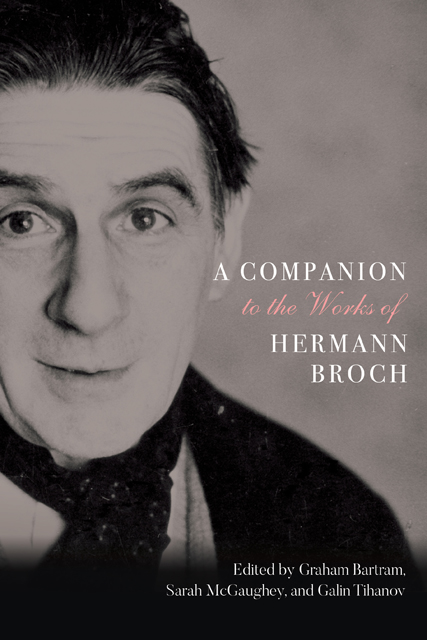Book contents
- Frontmatter
- Contents
- Preface
- Acknowledgments
- List of Abbreviations
- Introduction: Broch’s Life and Works
- 1 Perspectives on Broch’s Die Schlafwandler: Narratives of History and the Self
- 2 Hermann Broch and the Dilemma of Literature in the Modern Age
- 3 Interrogating Modernity: Hermann Broch’s Postromanticism
- 4 Broch and the Theater: Die Entsühnung and Aus der Luft gegriffen as Tragic and Comic Dramatizations of the Economic Machine
- 5 Limits of the Scientific: Broch’s Die Unbekannte Größe
- 6 Broch’s Die Verzauberung: Ludwig Klages and the Bourgeois Mitläufer
- 7 Hermann Broch’s Massenwahnprojekt and Its Relevance for Our Times
- 8 Human Rights and the Intellectual’s Ethical Duty: Broch’s Political Writings
- 9 Broch’s Der Tod des Vergil: Art and Power, Language and the Ineffable
- 10 From the “Tierkreis-Erzählungen” to Die Schuldlosen: The Creation of Broch’s Last Novel
- 11 Broch’s Legacy and Resonance
- Selected Bibliography
- Notes on the Contributors
- Index
Introduction: Broch’s Life and Works
Published online by Cambridge University Press: 20 January 2023
- Frontmatter
- Contents
- Preface
- Acknowledgments
- List of Abbreviations
- Introduction: Broch’s Life and Works
- 1 Perspectives on Broch’s Die Schlafwandler: Narratives of History and the Self
- 2 Hermann Broch and the Dilemma of Literature in the Modern Age
- 3 Interrogating Modernity: Hermann Broch’s Postromanticism
- 4 Broch and the Theater: Die Entsühnung and Aus der Luft gegriffen as Tragic and Comic Dramatizations of the Economic Machine
- 5 Limits of the Scientific: Broch’s Die Unbekannte Größe
- 6 Broch’s Die Verzauberung: Ludwig Klages and the Bourgeois Mitläufer
- 7 Hermann Broch’s Massenwahnprojekt and Its Relevance for Our Times
- 8 Human Rights and the Intellectual’s Ethical Duty: Broch’s Political Writings
- 9 Broch’s Der Tod des Vergil: Art and Power, Language and the Ineffable
- 10 From the “Tierkreis-Erzählungen” to Die Schuldlosen: The Creation of Broch’s Last Novel
- 11 Broch’s Legacy and Resonance
- Selected Bibliography
- Notes on the Contributors
- Index
Summary
In The Years 1930–32, as totalitarian regimes and movements were tightening their grip on much of Europe, the Munich- and Zurich-based Rhein-Verlag published the three successive parts of Die Schlafwandler (The Sleepwalkers, 1932). The novel trilogy took its readers on a journey through recent history, from the seemingly intact world of the late nineteenth century to the destruction of that world in the war of 1914–18, and to the unleashing of the contemporary economic, political, and cultural crisis. Gripping and disconcerting in its narrative style, Die Schlafwandler combined psychological depth and acuity with a broad historical and philosophical vision. It was also remarkable for one extrinsic fact: it marked the major literary debut of a forty-four-year-old former textile-factory manager and owner from Vienna, who up to that point had published nothing apart from reviews, articles, a poem or two, and two short stories—a man who, had he died at the same age as his contemporary Franz Kafka, would have merited little more than a footnote in the cultural histories of the twentieth century. As it was, Hermann Broch was to leave behind on his death in 1951 not only a substantial literary oeuvre, including (alongside Die Schlafwandler) the extraordinary lyrical novel Der Tod des Vergil (1945; The Death of Virgil, 1945), but also a corpus of philosophical, psychological, and political writings that, like the novels, were the product of a lifelong project: the quest to establish a new and viable basis for human and humane values amid the patent bankruptcy of traditional beliefs and value systems. This introduction will show how Broch’s journey through the upheavals of the first half of the twentieth century helped to shape a body of work that is gaining a renewed relevance and immediacy in the chaotic and unpredictable world of today.
A Life in Vienna: The First Forty Years (1886–1927)
Broch’s first forty years tend to be summed up as “his early career in textile manufacturing,” as distinct from his later period as an author and intellectual. It was a time when Broch’s life was dominated by family duties and accompanying professional expectations, both of which were psychologically and intellectually formative for him.
- Type
- Chapter
- Information
- A Companion to the Works of Hermann Broch , pp. 1 - 36Publisher: Boydell & BrewerPrint publication year: 2019



